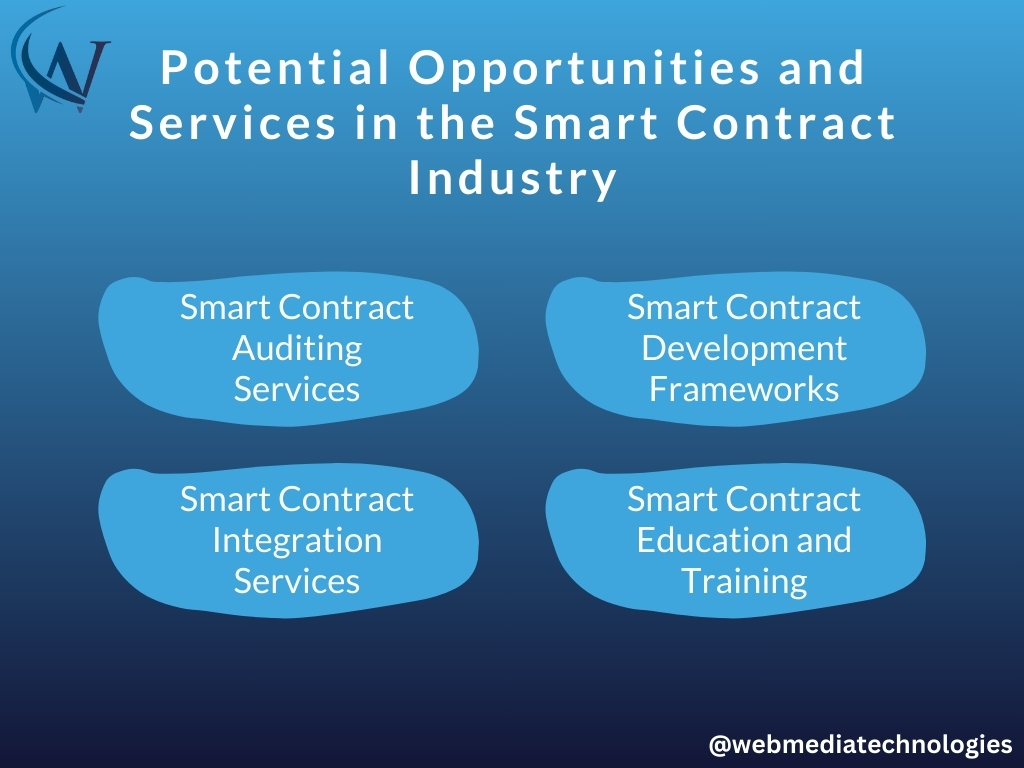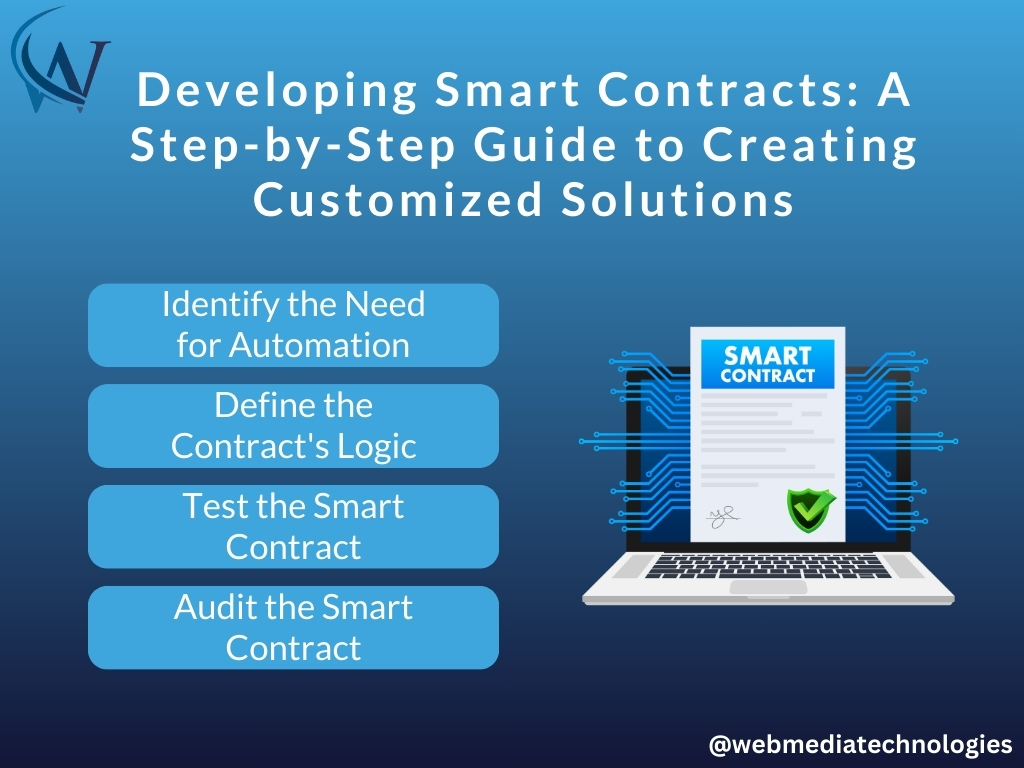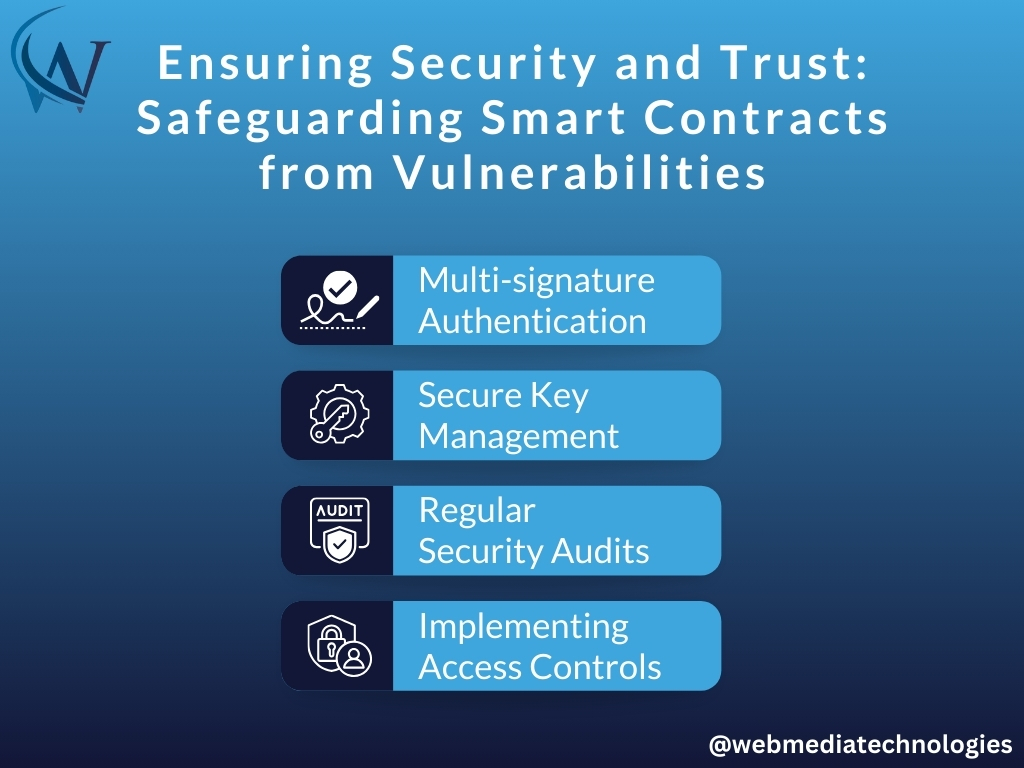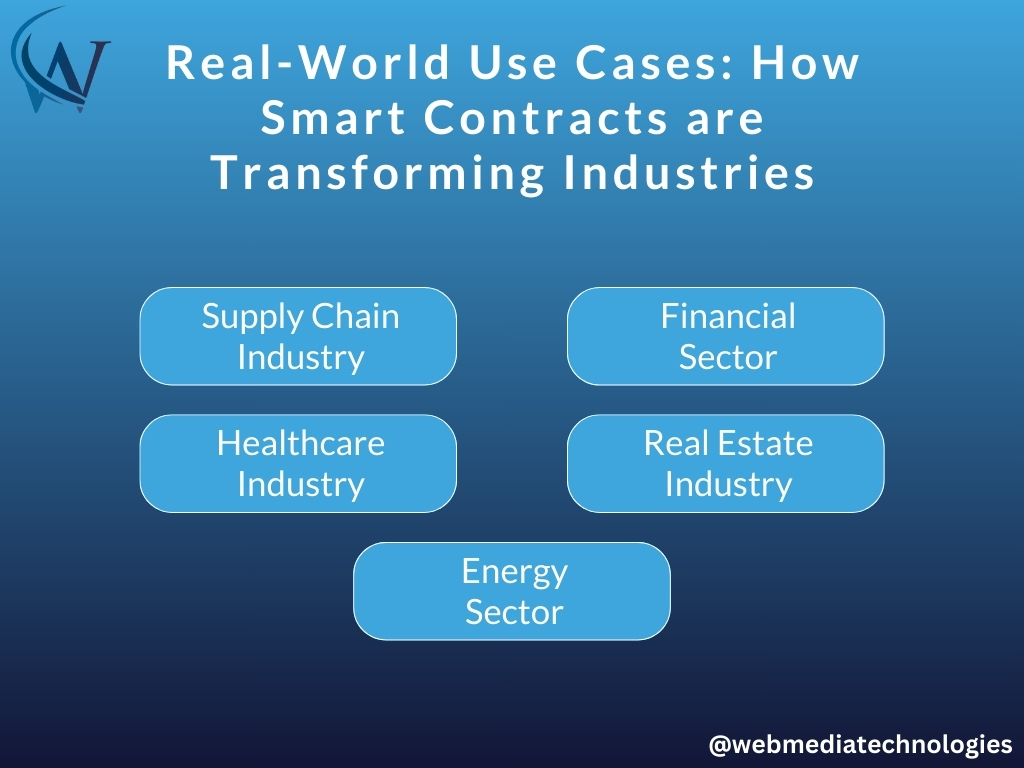Are you ready to harness the transformative power of smart contracts to revolutionize your business operations? Looking to streamline processes, enhance efficiency, and increase trust?
Let us guide you through the process of developing and deploying customized solutions for optimal business operations.
Smart contracts are computer programs on blockchain platforms that automatically execute actions when conditions are met. They eliminate intermediaries, provide transparency, and streamline business processes, resulting in cost reduction, increased efficiency, transparency, and reduced fraud risk. Developing them involves understanding blockchain technology, programming languages, defining logic, writing code, and testing.
Deploying them requires careful planning, platform selection, access controls, and security monitoring. Integration with existing systems maximizes potential. Use cases include supply chain, finance, and healthcare. Challenges include standardization and legal/regulatory issues, which can be overcome through research, collaboration, and staying updated. Smart contracts can revolutionize business operations.
Table of Contents
- The Introduction to Smart Contracts: Revolutionizing Business Operations
- Understanding the Basics: What are Smart Contracts and How Do They Work?
- Benefits of Smart Contracts: Streamlining Business Processes and Enhancing Efficiency
- Developing Smart Contracts: A Step-by-Step Guide to Creating Customized Solutions
- Deploying Smart Contracts: Best Practices for Successful Implementation
- Ensuring Security and Trust: Safeguarding Smart Contracts from Vulnerabilities
- Integrating Smart Contracts with Existing Systems: Maximizing Synergy and Compatibility
- Real-World Use Cases: How Smart Contracts are Transforming Industries
- Overcoming Challenges: Common Pitfalls and Strategies for Effective Smart Contract Management
- Final Thoughts
The Introduction to Smart Contracts: Revolutionizing Business Operations
Smart contracts have emerged as a groundbreaking technology with the potential to revolutionize business operations across various industries. These self-executing contracts, powered by blockchain technology, offer a secure and efficient way to automate and streamline business processes. By eliminating the need for intermediaries and providing transparency, smart contracts can transform the way businesses operate.
Understanding the Basics: What are Smart Contracts and How Do They Work?

Smart contracts are computer programs that automatically execute predefined actions when certain conditions are met. These contracts are built on blockchain platforms, such as Ethereum, providing a decentralized and immutable ledger for recording transactions. The code of a smart contract is stored on the blockchain, ensuring transparency and eliminating the need for trust in a centralized authority.
When a smart contract is deployed, it becomes part of the blockchain network and can be accessed and executed by anyone with the necessary permissions. The contract’s code defines the rules and conditions that must be met for the contract to execute. Once these conditions are fulfilled, the contract automatically executes the specified actions, like transferring funds or updating records.
Here are the 10 Potential Opportunities and Services in the Smart Contract Industry:
- Smart Contract Auditing Services: As the use of smart contracts continues to grow, there will be a need for specialized auditing services to ensure the security and accuracy of the code. These services would involve reviewing the code for potential vulnerabilities or errors and providing recommendations for improvement.
- Smart Contract Template Marketplaces: Just like we have marketplaces for website templates or plugins, there could be marketplaces specifically for smart contract templates. These platforms would allow developers to buy or sell pre-written smart contract templates, saving time and effort in developing from scratch.
- Smart Contract Insurance: With the potential risks involved in using smart contracts, there could be a demand for insurance products that protect against losses or damages caused by errors or vulnerabilities in the code. Insurance companies could offer policies specifically tailored to cover smart contract-related risks.
- Smart Contract Development Frameworks: As smart contract development becomes more mainstream, there will be a need for user-friendly frameworks that simplify the process of creating, testing, and deploying smart contracts. These frameworks could provide developers with tools and libraries to streamline the development process.
- Smart Contract Integration Services: Many businesses may already have existing systems and processes in place, and integrating smart contracts into these systems could be a complex task. Companies specializing in smart contract integration services could help businesses seamlessly incorporate smart contracts into their existing workflows.
- Smart Contract Escrow Services: Smart contracts can be used to facilitate secure and automated escrow services, where funds or assets are held in escrow until certain conditions are met. Escrow service providers could leverage smart contracts to offer secure and transparent escrow services without the need for intermediaries.
- Smart Contract Compliance Solutions: As smart contracts become more widely adopted, there may be a need for compliance solutions that ensure the contracts adhere to legal and regulatory requirements. Companies could develop tools or services that automatically check smart contracts for compliance and provide recommendations for adjustments if necessary.
- Smart Contract Arbitration Platforms: In the event of a dispute or disagreement related to a smart contract, specialized arbitration platforms could provide a decentralized and impartial environment for resolving conflicts. These platforms could leverage blockchain technology to ensure transparency and enforce the decisions made.
- Smart Contract Consulting Services: With the complexity of smart contracts and their potential impact on various industries, there could be a demand for consulting services that help businesses understand and navigate the world of smart contracts. These services could provide guidance on best practices, risk management, and implementation strategies.
- Smart Contract Education and Training: As smart contracts become more prevalent, there will be a need for educational resources and training programs to help individuals and businesses learn about smart contract technology and how to leverage it effectively. Companies could offer courses, workshops, or online tutorials to educate and upskill individuals in the field of smart contracts.
Benefits of Smart Contracts: Streamlining Business Processes and Enhancing Efficiency
The adoption of smart contracts offers numerous benefits for businesses. Firstly, smart contracts eliminate the need for intermediaries, such as lawyers or brokers, reducing costs and increasing efficiency. By automating contract execution, businesses can save time and resources, allowing them to focus on core activities.
Additionally, smart contracts provide transparency and immutability, ensuring that all parties involved have access to the same information, and that records cannot be tampered with. This enhances trust and reduces the risk of fraud or disputes. Furthermore, smart contracts can streamline complex business processes by automating repetitive tasks, reducing human error, and increasing accuracy.
- Cost Reduction: Smart contracts eliminate the need for intermediaries, such as lawyers or brokers, which can significantly reduce costs associated with contract execution and management.
- Time Efficiency: By automating contract execution, businesses can save time on manual tasks, allowing them to focus on more critical activities and ultimately enhancing overall efficiency.
- Increased Accuracy: Smart contracts are programmed to execute specific actions based on predetermined conditions, reducing the risk of human error and ensuring accurate contract execution.
- Transparency: Smart contracts provide transparency by allowing all parties involved to have access to the same information. This transparency enhances trust and reduces the likelihood of misunderstandings or disputes.
- Immutability: Once a smart contract is deployed on a blockchain, it becomes nearly impossible to alter or tamper with. This immutability ensures the integrity of the contract and reduces the risk of fraud or manipulation.
- Security: Smart contracts utilize cryptographic technology, making them highly secure and resistant to hacking or unauthorized access. This enhances data security and protects sensitive business information.
- Automated Compliance: Smart contracts can be programmed to enforce regulatory compliance automatically. This feature ensures that businesses adhere to legal requirements and reduces the risk of penalties or legal disputes.
- Streamlined Business Processes: By automating repetitive tasks, smart contracts can streamline complex business processes, reducing the need for manual intervention and increasing overall operational efficiency.
- Improved Auditing: Smart contracts record all activities and transactions on a blockchain, creating a reliable and auditable trail. This simplifies auditing processes and reduces the time and effort required for compliance audits.
- Enhanced Trust: The transparency, immutability, and security provided by smart contracts contribute to building trust among parties involved in a contract. This trust can lead to stronger business relationships and increased collaboration.
Developing Smart Contracts: A Step-by-Step Guide to Creating Customized Solutions

Developing smart contracts requires a solid understanding of blockchain technology and programming languages such as Solidity. The process involves defining the contract’s logic, writing the code, and testing it thoroughly to ensure its functionality and security. To develop a smart contract, one must first identify the specific business process or transaction that needs to be automated. Then, the contract’s logic and conditions must be defined, taking into account all possible scenarios and edge cases.
Once the logic is established, the code can be written using a programming language compatible with the chosen blockchain platform. After the code is written, it’s crucial to thoroughly test the smart contract to identify and fix any bugs or vulnerabilities. This can be done through unit testing, integration testing, and stress testing. Once the contract has been thoroughly tested and audited, it can be deployed on the blockchain network.
- Understand the Underlying Blockchain Technology: Before diving into smart contract development, it’s crucial to have a solid understanding of how blockchain works, its different types (public, private, consortium), and the specific blockchain platform you will be using.
- Identify the Need for Automation: Determine the specific business process or transaction that can benefit from automation through a smart contract. This could be anything from supply chain management to financial transactions.
- Define the Contract’s Logic: Clearly define the rules, conditions, and parameters that the smart contract will enforce. Consider all possible scenarios and edge cases to ensure the contract covers all potential outcomes.
- Choose the Right Blockchain Platform: Select the blockchain platform that best suits your needs, taking into account factors such as scalability, security, and consensus mechanism. Popular platforms include Ethereum, Hyperledger, and Corda.
- Learn the Programming Language: Solidity is the most commonly used programming language for developing smart contracts on the Ethereum platform. Familiarize yourself with Solidity or the relevant programming language for your chosen blockchain platform.
- Write the Code: Based on the defined logic, write the code for the smart contract using the chosen programming language. Ensure the code is clean, efficient, and follows best practices for security and readability.
- Test the Smart Contract: Thoroughly test the smart contract to identify and fix any bugs or vulnerabilities. This can be done through unit testing, integration testing, and stress testing to simulate real-world scenarios.
- Audit the Smart Contract: Engage a third-party auditor or conduct a comprehensive review of the smart contract’s code to ensure its security and reliability. This step is crucial to identify any potential vulnerabilities or weaknesses.
- Deploy the Smart Contract: Once the smart contract has been thoroughly tested and audited, deploy it on the chosen blockchain network. Ensure you deploy it to the appropriate network (testnet or mainnet) depending on the stage of development.
- Monitor and Maintain the Smart Contract: Continuously monitor the smart contract for any anomalies, security threats, or necessary updates. Regularly review and update the contract if needed to adapt to changing business requirements or to fix any issues that arise.
Remember, smart contract development requires ongoing learning and staying up to date with the latest advancements in blockchain technology and programming languages. It’s important to follow best practices and engage with the blockchain community to enhance your knowledge and skills in this rapidly evolving field.
Deploying Smart Contracts: Best Practices for Successful Implementation
Deploying smart contracts requires careful planning and consideration to ensure successful implementation. It’s essential to choose the right blockchain platform that aligns with the specific requirements of the business. Factors such as scalability, security, and community support should be taken into account when selecting a platform.
Furthermore, it’s crucial to define the permissions and access controls for the smart contract. This ensures that only authorized parties can interact with the contract and execute its functions. Regular monitoring and auditing of the contract’s performance and security are also essential to identify and address any issues promptly.
- Conduct Thorough Research on Different Blockchain Platforms: Before deploying smart contracts, it’s important to evaluate various blockchain platforms and select the one that best suits the specific requirements of the business. Consider factors such as scalability, security, community support, and ease of integration.
- Define Clear Objectives and Requirements: Clearly define the objectives and requirements of the smart contract implementation. This will help in selecting the appropriate features and functionalities required for the contract.
- Choose a Trusted Development Team or Partner: Working with an experienced development team or partner who specializes in smart contract development can greatly increase the chances of successful implementation. Look for a team with a proven track record and expertise in the specific blockchain platform being used.
- Define Permissions and Access Controls: Clearly define the permissions and access controls for the smart contract to ensure that only authorized parties can interact with it. This helps prevent unauthorized access and potential security breaches.
- Implement Code Review and Testing: Conduct thorough code review and testing before deploying smart contracts. This helps identify any vulnerabilities or bugs that could compromise the security or functionality of the contract.
- Regularly Monitor and Audit Contract Performance: Implement a system to regularly monitor and audit the performance of the smart contract. This helps identify any performance issues or potential security vulnerabilities. Regular audits also ensure that the contract is compliant with regulatory requirements.
- Implement Fail-safe Mechanisms: Include fail-safe mechanisms within the smart contract to handle unexpected scenarios or errors. This can help minimize potential risks and ensure the contract continues to operate smoothly.
- Keep the Contract Design Simple and Modular: It’s recommended to keep the design of the smart contract simple and modular. This makes it easier to understand, test, and maintain the contract. Complex contracts can be more prone to errors and difficult to update.
- Educate Stakeholders on Smart Contract Usage: Provide education and training to all stakeholders involved in the smart contract implementation. This ensures that everyone understands the purpose, functionalities, and limitations of the contract, reducing the chances of misuse or misunderstandings.
- Stay Updated With Industry Best Practices: Keep up with the latest industry best practices and guidelines for smart contract deployment. This helps ensure that the implementation remains aligned with emerging standards and security measures.
Ensuring Security and Trust: Safeguarding Smart Contracts from Vulnerabilities

While smart contracts offer numerous benefits, they are not immune to vulnerabilities and security risks. It’s crucial to implement robust security measures to safeguard smart contracts from potential attacks or exploits. One common vulnerability is the presence of bugs or coding errors in the contract’s code. Thorough testing and auditing can help identify and fix these issues before deployment. Additionally, implementing secure coding practices and following established standards can help mitigate the risk of vulnerabilities.
- Continuous Monitoring And Vulnerability Scanning: Implementing real-time monitoring and vulnerability scanning tools can help identify any potential vulnerabilities or weaknesses in smart contracts. This allows for prompt detection and mitigation of any security risks.
- Multi-signature Authentication: Implementing multi-signature authentication can add an extra layer of security to smart contracts. This requires multiple parties or entities to approve and execute a contract, reducing the risk of fraud or unauthorized access.
- Secure Key Management: Proper key management is crucial to ensuring the security of smart contracts. Implementing secure key storage solutions, such as hardware wallets or secure key vaults, can protect the private keys used to execute smart contracts.
- Secure Development Frameworks: Utilizing secure development frameworks specific to smart contracts, such as Solidity or Vyper, can help developers write secure code and avoid common vulnerabilities. These frameworks often provide built-in security features and best practices.
- Regular Security Audits: Conducting regular security audits of smart contracts can help identify any potential vulnerabilities or weaknesses that may have been missed during the development process. These audits can be performed by external security experts to provide an unbiased assessment.
- Code Review by Independent Experts: In addition to security audits, having independent experts review the code of smart contracts can help identify any potential vulnerabilities and offer suggestions for improvement. This peer review process can ensure that the code follows best practices and is secure.
- Implementing Access Controls: Implementing access controls within smart contracts can help restrict unauthorized access and ensure that only authorized parties can interact with the contract. This can be achieved through the use of role-based permissions or whitelisting.
- Regular Software Updates and Patching: Keeping smart contract software up to date with the latest patches and security updates is essential to protect against known vulnerabilities. Regularly updating the contracts’ dependencies and libraries can help mitigate potential risks.
- Ensuring Secure Data Transmission: Implementing secure communication protocols, such as encryption or secure socket layers (SSL), can protect the transmission of sensitive data between different components of the smart contract system.
- Education and Awareness Programs: Conducting training sessions and awareness programs for developers, auditors, and users can help educate them about the potential security risks associated with smart contracts. This can empower them to make informed decisions and take necessary precautions to ensure security.
Integrating Smart Contracts with Existing Systems: Maximizing Synergy and Compatibility
Integrating smart contracts with existing systems is a crucial step in maximizing their potential and ensuring compatibility. This integration allows businesses to leverage the benefits of smart contracts while maintaining their existing infrastructure. To integrate smart contracts with existing systems, businesses need to identify the areas where automation can bring the most significant benefits. This could include areas such as supply chain management, financial transactions, or customer relationship management. By integrating smart contracts with existing systems, businesses can streamline processes, reduce costs, and enhance efficiency.
Here Are 10 Key Considerations When Integrating Smart Contracts With Existing Systems:
- Comprehensive Assessment: Begin by conducting a comprehensive assessment of your existing systems to identify areas where automation through smart contracts can bring the most significant benefits. This will help prioritize integration efforts and ensure a focused approach.
- Compatibility Analysis: Determine the compatibility of your existing systems with smart contract protocols and technologies. Assess whether any modifications or upgrades are required to enable seamless integration.
- Data Mapping: Analyze the data flow between your existing systems and the smart contracts to ensure a smooth transfer of information. This will involve mapping data fields, formats, and protocols to ensure compatibility.
- Security Measures: Implement robust security measures to protect sensitive data and ensure the integrity of smart contract interactions. This may include encryption, multi-factor authentication, and regular security audits.
- Interoperability Considerations: Evaluate the interoperability of different smart contract platforms and protocols with your existing systems. Choose platforms that align with your business requirements and can seamlessly integrate with your systems.
- Stakeholder Engagement: Involve key stakeholders from different departments and teams in the integration process. This will ensure a holistic approach and address any specific requirements or concerns.
- Test Environments: Set up test environments to simulate integration scenarios and identify any potential issues or bugs. Thorough testing will help mitigate risks and ensure a smooth transition.
- Training and Education: Provide adequate training and education to employees involved in the integration process. This will empower them to understand and utilize smart contract functionalities effectively.
- Continuous Monitoring: Implement monitoring tools and processes to track the performance and effectiveness of the integrated smart contracts. Regular monitoring will help identify any anomalies or areas for improvement.
- Scalability Considerations: Anticipate future growth and scalability requirements when integrating smart contracts with existing systems. Ensure that the integrated solution can accommodate increased transaction volumes and evolving business needs.
By following these considerations, businesses can successfully integrate smart contracts with existing systems, unlocking their full potential and reaping the benefits of streamlined processes, reduced costs, and enhanced efficiency.
Real-World Use Cases: How Smart Contracts are Transforming Industries

Smart contracts have already begun to transform various industries, offering innovative solutions to long-standing challenges. In the supply chain industry, smart contracts can automate and streamline processes such as tracking shipments, verifying authenticity, and managing payments. This reduces paperwork, eliminates disputes, and enhances transparency. In the financial sector, smart contracts can revolutionize lending and insurance processes.
By automating loan agreements and insurance claims, smart contracts can reduce processing time, eliminate the need for intermediaries, and enhance trust between parties. Smart contracts also have the potential to transform the healthcare industry by securely managing patient records, automating insurance claims, and facilitating medical research collaborations. This can improve patient care, reduce administrative costs, and accelerate medical advancements.
- Real Estate Industry: Smart contracts can streamline the process of buying and selling properties by automating tasks such as title searches, escrow processes, and payment transfers. This can reduce transaction costs, minimize fraud, and expedite property transfers.
- Energy Sector: Smart contracts can facilitate peer-to-peer energy trading, allowing individuals and businesses to directly buy and sell energy from each other. This can enable more efficient use of renewable energy resources, reduce reliance on centralized energy providers, and lower energy costs for consumers.
- Intellectual Property Rights: Smart contracts can be used to establish and enforce ownership rights for creative works such as music, art, and patents. This can simplify the licensing process, ensure fair compensation for creators, and reduce copyright infringement.
- Voting Systems: Smart contracts can be utilized in voting systems to ensure transparency, accuracy, and tamper-proof elections. By recording and verifying each vote on the blockchain, smart contracts can eliminate the possibility of fraud and enhance trust in the electoral process.
- Supply Chain Management: Apart from the traditional supply chain industry, smart contracts can also transform other sectors such as food and pharmaceuticals. By enabling end-to-end traceability, smart contracts can ensure the authenticity and quality of products, prevent counterfeiting, and enhance consumer safety.
- Gaming Industry: Smart contracts can revolutionize the gaming industry by enabling decentralized and provably fair gambling platforms. This can eliminate the need for trust in centralized casinos, reduce transaction costs, and provide a more transparent and secure gambling experience.
- Legal Industry: Smart contracts can automate legal agreements, such as rental contracts or employment contracts, reducing the need for traditional legal intermediaries. This can lower legal costs, minimize disputes, and ensure faster and more efficient contract execution.
- Charity and Donations: Smart contracts can provide transparency and accountability in charitable donations by automatically distributing funds to specific causes or projects. This can enhance trust in the charity sector, ensure donations are used as intended, and increase donor participation.
- Logistics and Transportation: Smart contracts can optimize logistics and transportation operations by automating tasks such as route planning, freight tracking, and payments. This can improve efficiency, reduce costs, and enhance the overall supply chain management process.
- Government Services: Smart contracts can streamline government processes, such as issuing licenses, permits, and certificates. By automating these processes, smart contracts can reduce bureaucracy, eliminate corruption, and provide more efficient public services.
Overcoming Challenges: Common Pitfalls and Strategies for Effective Smart Contract Management
While smart contracts offer significant benefits, there are also challenges that need to be addressed for effective management. One common challenge is the lack of standardization and interoperability between different blockchain platforms. This can make it difficult to integrate smart contracts across multiple systems. Another challenge is the potential for legal and regulatory issues.
As smart contracts are relatively new, legal frameworks and regulations are still evolving. It’s crucial for businesses to stay updated on the legal implications of using smart contracts and ensure compliance with relevant laws. To overcome these challenges, businesses should invest in research and development, collaborate with industry experts, and stay updated on the latest developments in blockchain technology and smart contract management.
- Develop a Standardized Smart Contract Language: Creating a common language for smart contracts across different blockchain platforms can help facilitate interoperability and streamline integration processes.
- Establish Industry-wide Standards: Collaborate with other industry players to develop standard practices and guidelines for smart contract management. This can help ensure consistency and reduce potential conflicts between different systems.
- Invest in Blockchain Research and Development: Businesses should allocate resources to research and development efforts focused on improving smart contract management. This can help identify and address challenges as they arise, as well as drive innovation in the field.
- Engage With Legal Experts: Work closely with legal professionals who specialize in blockchain and smart contract law. This can help businesses navigate the evolving legal landscape and ensure compliance with relevant regulations.
- Develop Internal Expertise: Invest in training and education for employees to develop a deep understanding of smart contract management. Having internal experts can help businesses effectively manage and troubleshoot issues that may arise.
- Foster Collaboration With Blockchain Platforms: Establish partnerships and collaborations with different blockchain platforms to promote interoperability and ensure smooth integration of smart contracts across systems.
- Stay Updated on Regulatory Developments: Regularly monitor changes in regulations and legal frameworks related to smart contracts. This can help businesses proactively adapt their processes and remain compliant with the latest requirements.
- Implement Robust Security Measures: Smart contracts can be vulnerable to hacking and security breaches. Implementing strong security measures, such as encryption and authentication protocols, can help mitigate these risks and ensure the integrity of smart contract management.
- Leverage Blockchain Communities and Forums: Engage with online communities and forums dedicated to blockchain and smart contract management. This can provide valuable insights, best practices, and solutions to common challenges.
- Conduct Pilot Projects and Proof-of-concepts: Before fully implementing smart contract management, conduct pilot projects and proof-of-concepts to test the effectiveness and identify any potential issues. This can help refine processes and strategies before scaling up.
Final Thoughts
Harnessing the power of smart contracts can revolutionize business operations, offering streamlined processes, enhanced efficiency, and increased trust. By understanding the basics, developing customized solutions, deploying best practices, and ensuring security, businesses can leverage the full potential of smart contracts. Integrating smart contracts with existing systems and learning from real-world use cases can provide valuable insights and inspiration for implementing smart contracts in various industries. By overcoming challenges and adopting effective smart contract management strategies, businesses can unlock the transformative power of this groundbreaking technology.

Don’t miss out on this groundbreaking technology!
Contact us now to learn how our services can help you harness the power of smart contracts.

